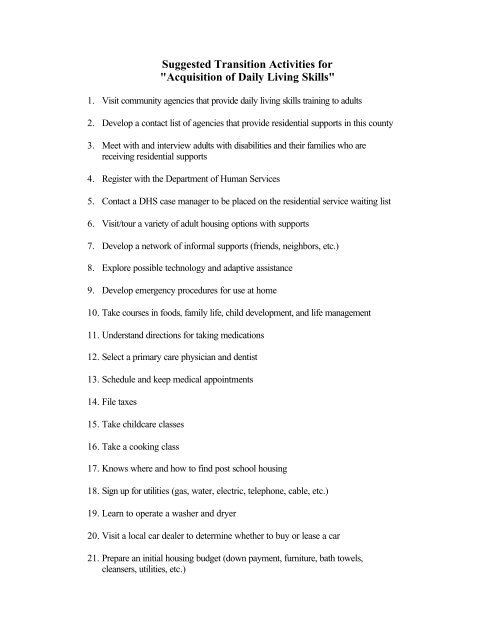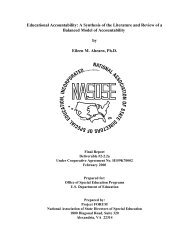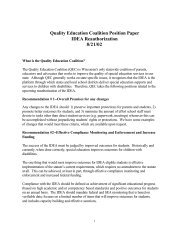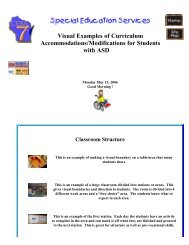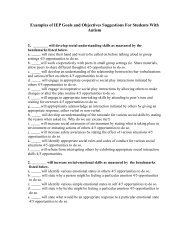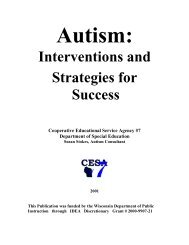Acquisition of Daily Living Skills - CESA #7 Special Education ...
Acquisition of Daily Living Skills - CESA #7 Special Education ...
Acquisition of Daily Living Skills - CESA #7 Special Education ...
- No tags were found...
Create successful ePaper yourself
Turn your PDF publications into a flip-book with our unique Google optimized e-Paper software.
Suggested Transition Activities for<br />
"<strong>Acquisition</strong> <strong>of</strong> <strong>Daily</strong> <strong>Living</strong> <strong>Skills</strong>"<br />
1. Visit community agencies that provide daily living skills training to adults<br />
2. Develop a contact list <strong>of</strong> agencies that provide residential supports in this county<br />
3. Meet with and interview adults with disabilities and their families who are<br />
receiving residential supports<br />
4. Register with the Department <strong>of</strong> Human Services<br />
5. Contact a DHS case manager to be placed on the residential service waiting list<br />
6. Visit/tour a variety <strong>of</strong> adult housing options with supports<br />
7. Develop a network <strong>of</strong> informal supports (friends, neighbors, etc.)<br />
8. Explore possible technology and adaptive assistance<br />
9. Develop emergency procedures for use at home<br />
10. Take courses in foods, family life, child development, and life management<br />
11. Understand directions for taking medications<br />
12. Select a primary care physician and dentist<br />
13. Schedule and keep medical appointments<br />
14. File taxes<br />
15. Take childcare classes<br />
16. Take a cooking class<br />
17. Knows where and how to find post school housing<br />
18. Sign up for utilities (gas, water, electric, telephone, cable, etc.)<br />
19. Learn to operate a washer and dryer<br />
20. Visit a local car dealer to determine whether to buy or lease a car<br />
21. Prepare an initial housing budget (down payment, furniture, bath towels,<br />
cleansers, utilities, etc.)
22. Cost compare for household items (appliances, linens, etc.)<br />
23. Meet with a doctor to discuss birth control/family planning options<br />
24. Manage daily time schedule<br />
25. Open a checking/savings account<br />
26. Manage money and pay bills<br />
27. Meet with a family financial planner<br />
28. Listen to the weather forecast to plan daily/weekly outings<br />
29. Develop a personal fitness routine<br />
30. Obtain a bank ATM card<br />
31. Visit a bank to discuss a car or school loan<br />
32. Meet with a potential landlord<br />
33. Investigate local insurance companies for automobile and rental or homeowner’s<br />
insurance<br />
34. Maintain a home or residence interior and exterior<br />
35. Purchase food<br />
36. Prepare meals<br />
37. Purchase clothing and learn how to care for clothes<br />
38. Learn about the physical and personal care <strong>of</strong> children<br />
39. Learn and practice decision making skills<br />
40. Time management skills<br />
41. Consumer skills<br />
42. Cares for personal toileting needs<br />
43. Dresses and undresses self
44. Able to communicate personal information (i.e. name, address, gender, telephone<br />
number)<br />
45. Prepares and serves foods which require little or no cooking<br />
46. Demonstrates acceptable eating behaviors (i.e. uses utensils appropriately, chews<br />
with mouth shut, takes appropriate sized bites, uses napkin, practices good<br />
manners)<br />
47. Makes local calls and responds appropriately to incoming calls<br />
48. Dresses appropriately for specific situations (i.e. weather, special events, casual,<br />
seasonal)<br />
49. Able to maintain a comfortable room temperature in the home (i.e. open and close<br />
windows, adjust thermostat, open and close doors)<br />
50. Chooses and wears clothing appropriate in size, color, pattern, and style<br />
51. Demonstrates safety precautions in the home (i.e. use <strong>of</strong> locks, proper use <strong>of</strong><br />
appliances)<br />
52. Recognizes when clothing repair is necessary and can either mend the item or<br />
arrange for assistance<br />
53. Demonstrates an understanding <strong>of</strong> words found in the home environment (i.e. on<br />
appliances, on medicines, on recipes)<br />
54. Acts responsibly in caring for own and others’ property<br />
55. Able to prepare and serve simple foods which require cooking<br />
56. Maintains a neat appearance (i.e. hair style, proper use <strong>of</strong> make-up, appropriate<br />
shaving, clean clothing)<br />
57. Maintains a clean body (i.e. bathes, uses deodorant, brushes teeth, cares for<br />
menstrual needs, washes/dries hair)<br />
58. Recognizes when specific things need cleaning (i.e. sinks, floors, clothing)<br />
59. Able to determine temperature by reading a thermometer<br />
60. Prepares and serves at least 3 simple meals which require little or no cooking<br />
61. Demonstrates proper judgment in food storage
62. Knows how and when to seek medical assistance<br />
63. Treats minor illnesses (i.e. headaches, nausea, fever, body aches)<br />
64. Maintains own bedroom<br />
65. Performs light household maintenance (i.e. simple repairs, change light bulbs,<br />
unclog drain)<br />
66. Demonstrates qualities <strong>of</strong> a good citizen (i.e. obeys rules and laws, shows<br />
consideration for others, respects the environment)<br />
67. Develops a shopping list based on recognized household and personal needs<br />
68. Has an acceptable understanding <strong>of</strong> concepts related to sexual awareness<br />
69. Sorts, washes, dries, folds, and puts away laundry<br />
70. Performs basic first aid skills (i.e. treating cuts and burns, performing the<br />
Heimlich maneuver)<br />
71. Understands measurement as it applies to everyday living<br />
72. Demonstrates advanced telephone skills (i.e. long distance, phone card, directory,<br />
directory assistance, taking messages, call waiting/forwarding, cell phone)<br />
73. Performs written correspondence<br />
74. Practices preventive health care (i.e. manages body weight, gets sufficient sleep,<br />
does not abuse alcohol/drugs, makes and keeps routine medical/dental<br />
appointments)<br />
75. Knows how to respond to household emergency situations (i.e. plumbing<br />
problems, heating problems, fire, accidents, poisoning, weather emergencies)


